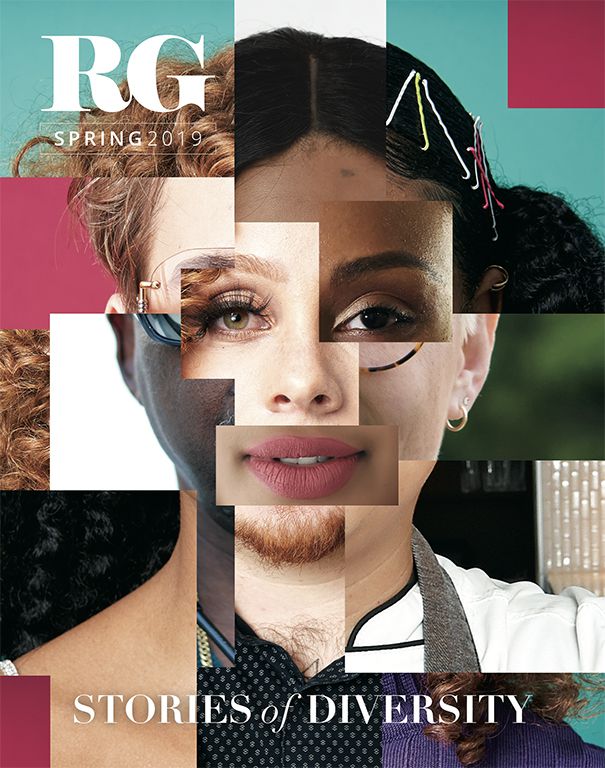Stories of Diversity
By Annabel Cooper
We are all a product of our upbringing, our surroundings, the hand we were dealt with physically and mentally, and who we decide to be, and this diversity creates differences of knowledge, experience and understanding, and should be celebrated. Most of us, at some stage in our lives, have been singled out because of our circumstances, what we look like, who we are or what we believe. We all have a diversity story.
Race
Year 8 Students from Saltus Grammar School
At the end of 2018, the Saltus Year 8 students studied Florenz Webbe Maxwell’s book, Girlcott,which tells the story of fictional character Desma Johnson, a black Bermudian girl living in segregated Bermuda in 1959 in the run-up to her 16th birthday. She wants to celebrate by going to the cinema with her friends, however, the theatre boycott is about to begin.
By studying this book, the students received an eye-opening account of Bermuda’s racial history and while they were aware that in the past black Bermudians had been treated badly, for many of the students this was the first time they understood what that meant.
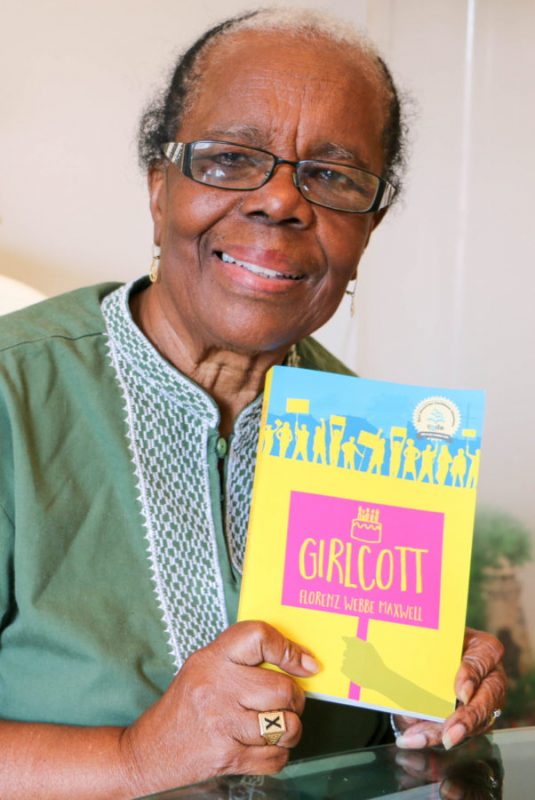 They say they were particularly shocked to learn that the Government would pull mortgages for black people who spoke out and that you were prevented from doing things because of the colour of your skin. “We feel sad about how people were treated because of their skin colour. This was unfair. Everyone is created equal.”
They say they were particularly shocked to learn that the Government would pull mortgages for black people who spoke out and that you were prevented from doing things because of the colour of your skin. “We feel sad about how people were treated because of their skin colour. This was unfair. Everyone is created equal.”
Maxwell had been part of the secretive Progressive Group who organised the boycott and the students’ project culminated in a meeting with her and fellow Group members Gerald and Izola Harvey.
In actually meeting living members of the Group it really hit home that this hadn’t happened that long ago. They were also struck by how humble they were and the fact that they had remained anonymous for so long. They needed to maintain secrecy at the time, but that secrecy continued for a further 40 years.
“What they did was really positive,” says one of the students. “They were trying to stop racism in Bermuda; they made a real difference even though they were anonymous. It wouldn’t have worked if they had shown who they were.
“They showed they cared about what they were doing. It wasn’t for fame. It was never about them. It was about changing the way things were.”
The group of students interviewed was diverse, and they all agreed that because of the Progressive Group there is less racism than there used to be. While none of the students interviewed has experienced racism first hand, they were all aware that it still existed on the island especially in the form of comments and insults. “People need to get with the time!” says one.
Head of English, Louise Berryman, who managed the project, explains that they chose “Girlcott” because “it’s dealing with the fact that you couldn’t do something because you were a girl and because of the colour of your skin. We felt it covered two aspects of diversity at the same time.
“It’s such an important part of Bermudian history and the book is written so well that it’s something we really wanted to cover.”
When asked about the students’ reaction to the issues dealt with in the book, Berryman explains that there is a part in the book where Desma is told she can’t become an Actuary because she is black and a girl: “They were shocked. In today’s context, students struggled to understand that people were limited because of their race and/or gender.”
Ann Paynter, Director of Middle School, adds: “I think it’s incredibly important that our students are aware. I think our students talk freely, they express opinions freely. I think this generation is going to be the generation to really move things forward and I think that’s amazing.”
7 students in total were interviewed including six Bermudians.
Gender
Sergeant Patricia ‘Jenny’ Woolridge, 31, Female Soldier in the Royal Bermuda Regiment
Although Sgt. Woolridge has always enjoyed physical activity, she hadn’t always wanted to be a soldier and before 2011 had never considered joining the Royal Bermuda Regiment. It wasn’t until she was back on the Island looking for a job that her sister forwarded her an email advertising the Regiment’s Recruit Camp, which paid $2,000 for the two weeks, that she found her calling.
“I was always someone who was into sports and physical activities,” she says. “I figured it’s a challenge but I can get paid to do it, so why not. After my recruit camp, I fell in love. The money didn’t matter.
“The environment makes you push yourself. The things you thought you couldn’t do, you can because you’ve worked so hard. You’ve practised; you’ve trained. Sometimes I think I have to work twice as hard because I’m a female, but all those things make me a better person.
“Being a woman in a man’s world is always a challenge. Sometimes physical, sometimes mental. I like to have my hair out and my nails done, but at camp you can’t have your hair out, but this is a commitment. I chose to do it. I pull my hair back and get back in.
“When you know, as a female, you can accomplish what I’ve accomplished in a man’s world, it is awesome. Being able to prove people wrong by doing what you enjoy is an amazing feeling.”
Woolridge explained that in spite of enjoying what she does, she has, at times, found it tough, but that this experience not only makes her better at her job, but also puts her in a stronger position to help others.
“In my first year I quit on one of our route marches, and to this day I will never quit again. The feeling of quitting was just the worst in the world. That was an experience and challenge that I had to overcome. I tell people I quit once and tell them they will hate themselves if they do it.
“I speak from experience when I speak to my troops.”
I don’t feel it’s a man’s world all the time because I’m doing what the men are doing. I work as hard as anyone else. I don’t expect my troops to do anything I can’t do.
“When you have new people, who aren’t used to having females telling them what to do, there’s always a bit of push back, but in time everyone learns that Sgt. Woolridge has nothing negative to say. Everything I’m asking them to do, they need to do. People realise you are actually helping them.
Woolridge said that one of the most rewarding aspects of her job is watching how people grow and develop and the fact the Regiment places emphasis on mentoring: “I still have mentors, and I mentor others,” she says. She also explains that during Recruit Camp there’s nearly always one female on staff, so women have support readily available.
For any women considering the Regiment, Woodridge says, “It’s a big challenge but push yourself, and when you get to where you want to be, it’s so rewarding. Don’t fall for the typical stereotype that because this is a man’s world, you can’t do it. Always try to prove someone wrong and change that stereotype.”
Currently around 18-20 per cent of the Regiment is female.
Sgt. Woolridge is also a Business Analyst in the Project Management Office of the Bermuda Monetary Authority.
Opinion
Tony Brannon, 67, Artist, Entertainer and Same Sex-Marriage Activist
Brannon has opinions about many things, but in 2015, his strong opinion about making same-sex marriage legal in Bermuda made a significant difference to people’s lives.
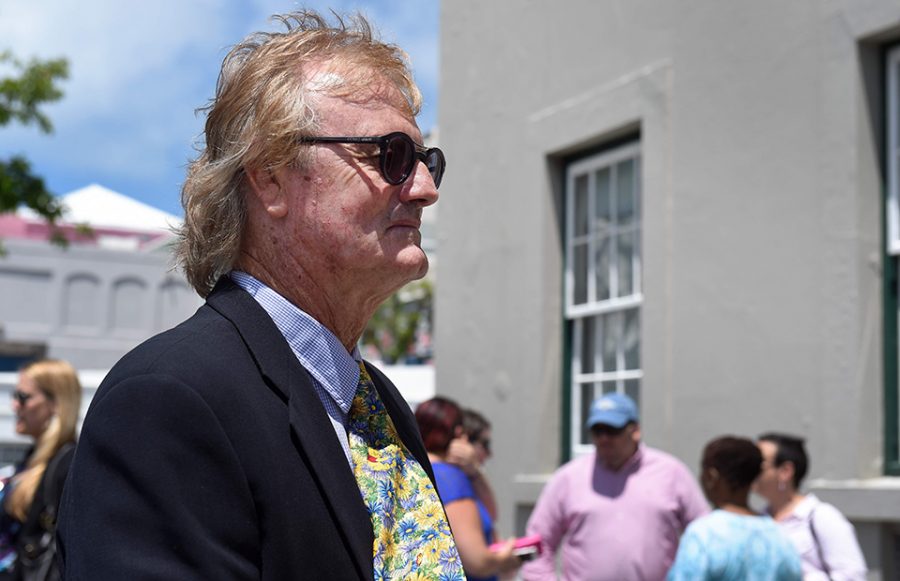 He became involved in the campaign “by accident, although I’ve always been aware of the journey in Bermuda of equality because you can’t escape it. I remember standing in my Dad’s shop watching the theatre boycott 60 years ago.
He became involved in the campaign “by accident, although I’ve always been aware of the journey in Bermuda of equality because you can’t escape it. I remember standing in my Dad’s shop watching the theatre boycott 60 years ago.
“It was because of a Royal Gazette article that appeared in April 2015 about a lesbian couple on a cruise ship who were denied the right to marry on that ship because it happened to be registered to Bermuda. It immediately triggered off memories of the Rosie O’Donnell cruise in 2007, and I thought ‘here we go, this is 2015, surely this is ridiculous?”
In 2007, R Family Vacations, a travel company specialising in holidays for LGBT families and their friends, and a business in which Rosie O’Donnell was involved, cut Bermuda from their cruise schedule to avoid potential protests.
“I posted about this, and I started a petition. I put it out there, and it caught on fire really quickly. 3,500 signed it within a week so I thought, ‘what do I do next?’ Brannon approached the OBA who was in Government at the time but discovered they didn’t want to deal with it: “They all thought same sex-marriage was an election losing issue. It made me so angry that I dug my heels in!”
“The real glue that made it all come together was Mark Pettingill who said he saw a path through the courts on this.” Mark represented Winston Godwin and Greg DeRoche.
“We went to court, and we won. Same-Sex Marriage became legal in May 2017 and then, of course, the election was held not too long afterwards. The PLP said they would change this. They got into power, and Walton Brown was given the difficult task of coming up with a compromise situation – domestic partnerships. We viewed this as an attack on equality and human rights. The Government legislated that gay people can almost be equal but not quite.
“It’s 99.9 per cent over. Obviously, acceptance and how everyone gets on in Bermuda and how equality stretches across the board, racially, sexually, is an onward going thing. It’s one of those things I hope people will come together on.
“I am pleased that I have done it. There is nothing better than seeing the faces of the LGBT community after the first court victory, after the second court victory and even more so after the third when I saw the joy on the faces of people who just wanted to marry the person they love. There were guys, ladies, mixed race – it was a real quilt of what Bermuda is in straight life.”
Age
Ashley Stephens, 16, Young Entrepreneur and Owner of Ashley’s Lemonade
Ashley Stephens proved that age was no barrier to business when she started selling lemonade from outside her parents Pembroke shop, Upscale Fashions, at the tender age of seven years old. She is now a refreshing staple throughout the summer and at many Bermudian events with 11 people working for her overall including two full-time employees.
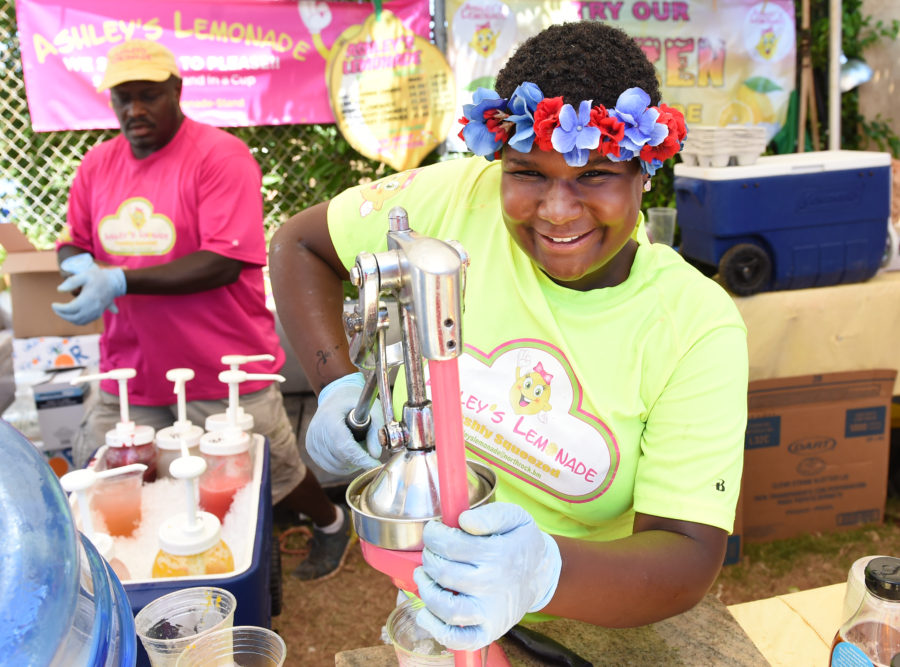 “I knew I wanted to have my own business because both my parents have their own business and I wanted to be a part of it,” says Stephens.
“I knew I wanted to have my own business because both my parents have their own business and I wanted to be a part of it,” says Stephens.
I looked up kids’ businesses on the Internet, and I found lemonade. It was something that hadn’t been done before in Bermuda – freshly squeezed for each customer.
“We started off pre-made, but by listening to our customers, we decided to make it in front of them, so we had the interaction with them.
“Other than me not being able to drive and a very small amount of documents, I was able to run my business as well as anyone else my age.”
Stephens said that when she first started she learned a lot on the job, but her parents, Earlette Stephens and Waymond Hill helped her: “I learned by doing. I was put in the position where I had to do it. My parents were a great help of where to go. We did our research and made all the relationships with the wholesalers and customers. It was a trial and error learning experience. I had a lot of support from everyone – the wholesalers, the health department, the chamber of commerce.
“Every customer gave me support along the way. They were very excited to see a young entrepreneur starting at such a young age. I was judged very positively. I was given a lot of encouragement to continue doing what I was doing.
“People were most enthusiastic about my age and very enthusiastic about the product. They were excited about seeing a young girl following her dreams. The customer service made everyone very happy.”
Still only 16, Stephens is currently attending Bermuda College and is also home-schooled. She has been making lemonade now for over 8 years and has no plans to stop.
“We have multiple ideas for expanding the business. We’re going green; we have reusable Ashley’s cups for sale and straws as well. We will encourage customers to bring their cups or purchase a reusable one from us. We have the metal, bamboo and collapsible reusable straws that we started selling at the end of last year.
“I have millions of ideas in my head, but Ashley’s lemonade is definitely sticking around for the long run and will keep growing into exactly what I want it to be.
“Age should never be a barrier to business. It’s never too early and never too late!”
Physical Disability
Vaughn Mosher, 71, Counsellor, Coach, Consultant and Founder of Benedict Associates Ltd.
Vaughn Mosher has relied on a mobility scooter since 2009. When he was 17 years old, he had a bad accident on a mountain road and crushed his spine by several inches. He was paralysed from the waist down for 6 months. Despite the doctors thinking he would never walk again, he was walking with only one cane by the time he started college two years later.
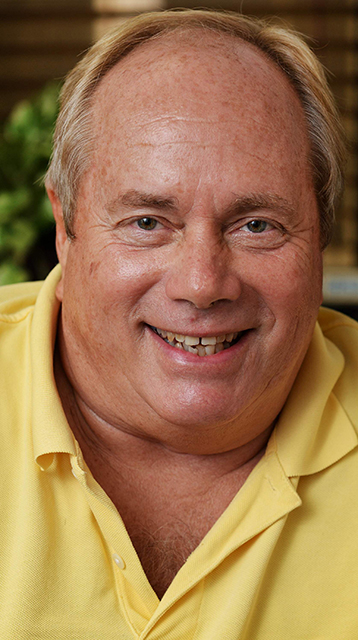 “Most of my adult life has been walking with a cane and being able to climb mountains and ride a motorcycle, carry the kids on my shoulders, have a full life. I’ve had 50 years of relatively traditional living.”
“Most of my adult life has been walking with a cane and being able to climb mountains and ride a motorcycle, carry the kids on my shoulders, have a full life. I’ve had 50 years of relatively traditional living.”
Then, in 2008, on the very day Barack Obama was elected President of the United States, Mosher was whisked to Boston to have both knees and his left hip removed because of an infection.
The doctors thought I was a goner. I was in such bad shape because the infection manifested so quickly.”
Once again Mosher defied expectations and after an 18-month process of joint replacement, he was using a mobility scooter.
Getting around Bermuda on his scooter has its challenges, but with the help of his family and friends, and sometimes complete strangers, it is a challenge that hasn’t stopped him getting into work every day, socialising or eating out. He and his wife, Roberta, have also highlighted where improvements need to be made, especially in the City of Hamilton, to make life easier for others in a similar situation.
“The Corporation of Hamilton is fixing things little by little. My wife was on the Accessibility Committee for Government. She was taking pictures and submitting where things needed attention.
“There are some restaurants – the MEF group has done a great job. Harbourfront, Elbow Beach and even Little Venice have some ramps where I can zoom right up. There are other places like The Hog Penny, which is such a potentially easy fix. It could be fixed in a day, and it’s just bad enough that there’s no access there.”
He does say however, that there are a couple of his favourite restaurants he can no longer go to because they would need to install lifts or escalators, which, he says, doesn’t make sense. He also hasn’t been able to drive a car for 10 years but is looking into one where the gas and break are on the steering wheel.
“I really would like to drive again. My wife drives me into work every day. She takes the scooter apart, puts it into the trunk and then unloads. Often, strangers stop and say can I help, and that’s lovely that they do.
“I’ve been on the Bermuda sloop. They brought the hoist over and brought me on like cargo. They rigged me in, scooter and all, for a cocktail party. A delightful experience!
“What I really appreciate are the little kids. You can see them pointing and asking their parents ‘what’s that?’ Their eyes light up when they see the scooter. Every now and then I offer the parents if one would like a ride and I give them a little ride down the street and back.
“I’m certainly not deluded in realising I have limitations. I have such a full life. I really don’t feel disabled. I think it’s an attitude as to how one carries oneself. We do what we need to do.”
Religion
Nazma Amirali, 43, Muslim, Kenyan and a Hairdresser at Inner Sanctum
Nazma Amirali grew up in Nairobi, Kenya and moved to Bermuda in 2004. She met her Portuguese husband, Joao, here and he decided to convert to Islam so their family could all be the same. They have two young children, and she explains what it is like for her and her family being Muslim in Bermuda.
Being a Muslim here is very peaceful. Nobody comes to bother you about how you’re dressed. Here, everybody’s respectful of each other.
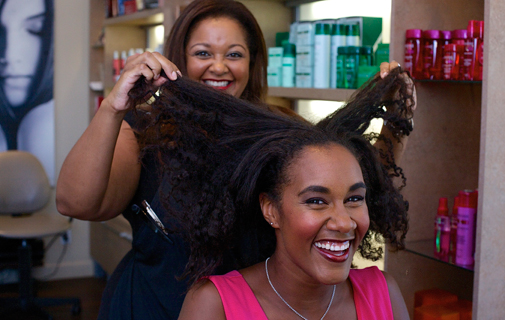 “A lot of people are believers in something and everyone respects each other’s religion, and I think that’s a beautiful thing.
“A lot of people are believers in something and everyone respects each other’s religion, and I think that’s a beautiful thing.
“It feels like home. We worship either at Masjid Mohammed, the mosque in town and also because I live in Warwick, we tend to go more to Masjid Quba, which is near the Lighthouse. The Muslim community is quite big. There are all kinds of people, from everywhere.”
Masjid is the Arabic word for mosque.
During the holy month of Ramadan Muslims have to fast during daylight hours. That includes drinking liquids: “The first few days are always hard, no matter what time of the year Ramadan falls, but you’ve put your mind to it, you know you’re doing it for your cause so you just get on with it and it’s not so bad.”
In terms of regular prayers throughout the day, Amirali says: “I usually don’t because of the schedule of work, but if I am free I go to the mosque and pray there. If there’s a function at the mosque, I will take a little time off work. For daily prayers, I usually pray at home.”
Amirali has a son who is almost 7 and a 4½-year-old daughter, and she says that there are some challenges, especially when it comes to Christmas: “We explain to them, and they understand, that we have our own celebrations, and everyone has their own celebrations, but we’re all the same people.
“We celebrate Eid. There’s the Eid that comes after Ramadan, Eid al-Fitr and there’s Eid al-Adha, which is after the Haj pilgrimage. We usually get together at the Mosque. We cook, we pray, we eat. There’s usually a talk of Thanksgiving, reminding ourselves what the purpose of the day is. We always do something special for the children. We’ll have fun activities for them.”
On a daily basis, Amirali’s children wear regular clothes, but will get dressed up for special occasions. “My daughter wears her scarfs, but she’s still small, so I don’t force her to wear it. If we go to the mosque for a big prayer, then they have their attire to wear. She has a little abaya, or she can just wear a nice dress with her scarf, and he has his kanzu, which is the long shirt and his hat.”
In terms of their schooling, Amirali says they are understanding of their values: “If there’s a function at school, and they may be doing a BBQ, then we let them know what the children can or cannot eat, or we send food in.”
Muslims must eat meat that has been prepared according to the halal method, and she says that is easy to come by in Bermuda: “Lindo’s and The Marketplace carry Halal meat and we can buy it from the Brunswick Bakery.”
Socio-Economic Circumstance
Jamel Bean, 43, Manager at the Salvation Army Emergency Housing Complex
Jamel Bean was born and raised in the Salvation Army as both his parents had very active roles in the organisation. He has continued their legacy by dedicating much of his working life to helping those who turn to the Salvation Army for help and has also gained a background in psychology and counselling.
“I used to work as an addiction counsellor at Harbour Light for 7 years. Then I worked in the education system, then back to the Salvation Army.”
Bean explains that the work he does in the shelter involves assisting “individuals who are homeless or may have a housing situation – there are different types of homelessness. There are individuals who go to work but are homeless. They may be living in an apartment with other people because with the money they make they may not be able to pay for an apartment on their own.
“We provide housing, we assist them with finding employment. If someone wanted to further their education, we assist them. We work with clients to achieve the goals they set.”
When asked about the people who come to the shelter and why, he says: “Life happens. Life situations, personal choices. We’ve had individuals laid off from their job so weren’t able to continue to stay in their house.We have individuals who, by making choices – they refused to receive support from family or there may have been broken relationships between them and their family, so there is nowhere else they can go, so they come seeking assistance.
Every person that comes through the shelter, their face and situations are different.”
The work Bean does highlights the hardship faced by many in Bermuda, but through his work, there are also inspirational tales that are a testament to the work done by those at the Salvation Army and highlight what can be achieved in spite of everything.
“We had a 21-year-old female who came to the shelter. She had the determination to better herself. She had the desire to want to go back to school. She later enrolled in the Bermuda College to pursue her dream of becoming a nurse.
He also talks about a male client who struggled with alcohol. “To be able to give him support and for him wanting the support, over time, then when he stopped drinking, he moved on from the shelter. We assisted him in acquiring housing. He then also became an active member in one of our committees.”
In addition to the Emergency Housing Complex and Harbour Light Rehabilitation Centre, the Salvation Army also has a family services programme, thrift store and a soup run that goes out six days a week.
This article was originally published in the Spring 2019 edition of RG Magazine.

